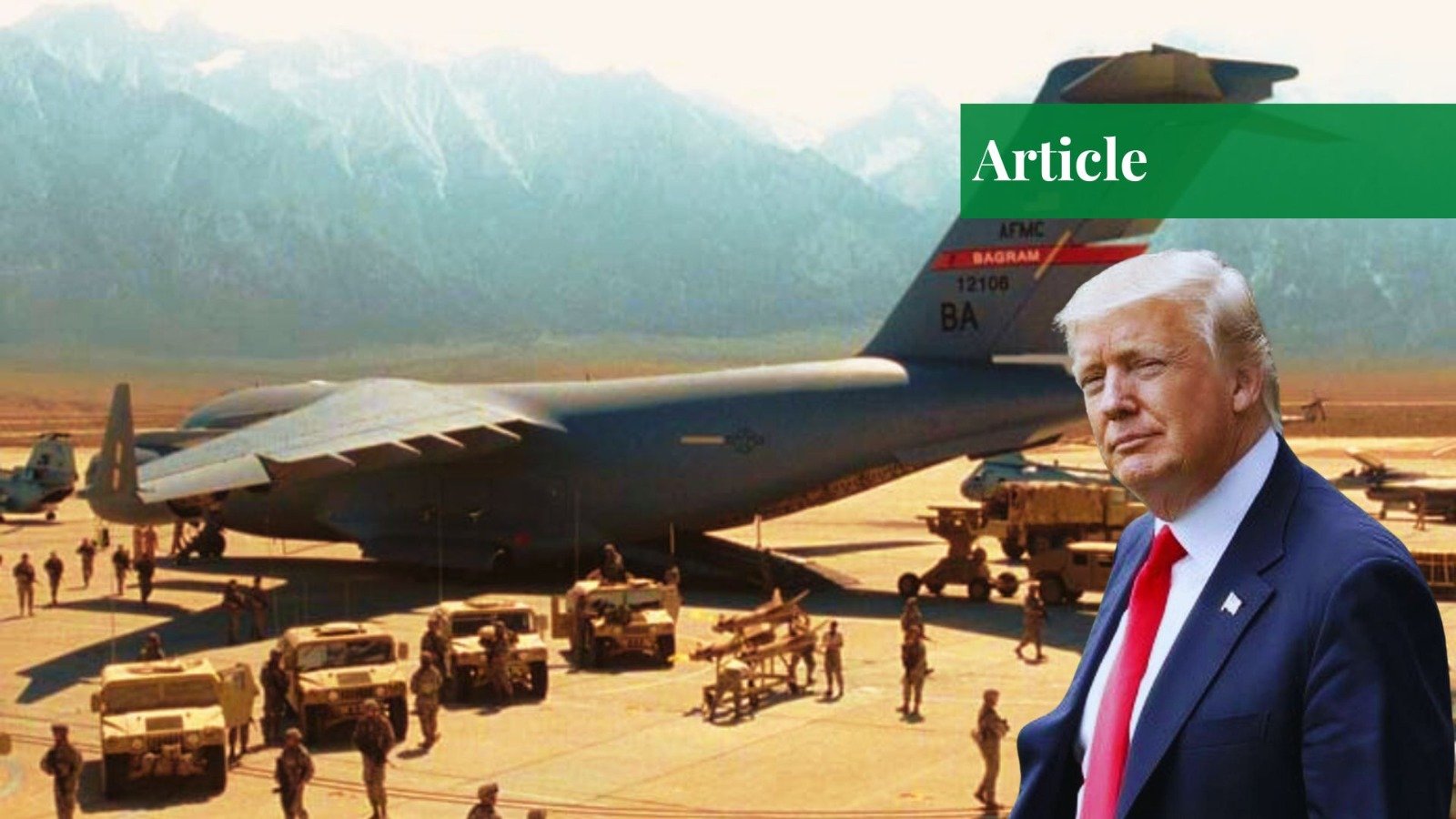Trump Reveals US Intent to Reclaim Bagram Air Base
After almost 4 years of the US withdrawal from Afghanistan, the Trump administration seeks to regain access to the Bagram air base. US President Donald Trump demonstrated the US government’s intent to regain access to this base during his recent visit to the United Kingdom. He stated, “We’re trying to get it back, by the way; that could be a little breaking news. We’re trying to get it back because they need things from us.” The statement came days after a meeting between a US delegation and the Taliban officials in Kabul. The US delegation visited Kabul to negotiate the release of the US prisoners. Allegedly, the two sides discussed the issue of the Bagram air base, and the Taliban government also put forward their demands to the US delegation during this meeting.
The Taliban’s Search for Legitimacy Amidst Economic Sanctions
Since their return to power, the Afghan Taliban have been desperately seeking international recognition. The United States has also imposed economic sanctions on the Taliban government, worsening the humanitarian crisis in the country. Moreover, US sanctions have hindered other nations from recognizing the interim Taliban government. Since then, only Russia has recognized the Afghan Taliban as the de jure government in the country. The Taliban government seeks to establish diplomatic relations with all countries. Moreover, it also seeks to improve its bilateral relations with the United States to get rid of its economic and diplomatic crisis. President Trump’s statement also hints at this demand of the Afghan government.
US Geopolitical Motives: Countering China and Russia
On the other hand, the United States is anxious over the swift rise of Russia and China as global superpowers. Washington seeks to regain access to the Bagram air base to strengthen its regional intelligence and surveillance network. While talking about the reason behind his push to reclaim Bagram base, he stated, “One of the reasons we want the base is it’s an hour away from where China makes its nuclear weapons.” The Bagram base is merely 1,200 meters away from China’s critical nuclear testing site and missile base, Lop Nur.
As per the US Air Force, “The [Bagram] airfield has an 11,800-foot [3,597 m] runway capable of serving bomber and large cargo aircraft.” This reflects the reason why President Trump is interested in reclaiming this base. Washington wants its bombers and military troops to be present in the region to give a swift response to any regional military action.
The presence of US troops will provide it with strategic leverage in the region. The US could exert significant pressure on China, Iran, and Russia by placing its troops in Afghanistan. The United States’ support for Taiwan will also strengthen if it ever succeeds in regaining the Bagram air base. This will also put the Chinese nuclear facility of Lop Nur on the US radar.
In addition, this will also threaten China’s Belt and Road Initiative (BRI) project. Pakistan hosts BRI’s flagship project, CPEC. The United States has always been hostile to the CPEC. It exerted significant pressure on Pakistan to suspend this project. However, Islamabad is determined to complete this project and strengthen its bilateral ties with Beijing. The two countries are also cooperating over the construction and operation of the Gwadar port, which is critical for safe and cheap energy trade for China.
China and Russia Deepen Their Ties with Afghanistan
Furthermore, China has also established significant relations with Afghanistan. Beijing is interested in Afghanistan’s vast mineral resources. According to some reports, Afghanistan holds 1.4 million tonnes of rare earth minerals, worth around $1 trillion. Last year, a Chinese firm signed a $450 million deal to explore Afghanistan’s minerals. In 2023, China and Afghanistan signed a $540 million energy deal. Both countries have also demonstrated interest in cooperating in multiple sectors. China and Afghanistan are also holding talks for the latter’s formal participation in BRI. The United States is also interested in Afghanistan’s rare earth minerals. It seeks to disrupt growing relations between China and Afghanistan.
Russia has gained significant diplomatic leverage around the world over the past few years due to its inclusive policies and leading role in BRICS. For the past few years, Russia has raised its voice for all the oppressed people of the world, especially in Gaza. Russia’s official recognition of the Taliban government in Afghanistan has provided it with great diplomatic leverage over the country. Russia’s top concern with the Taliban government was the presence of terrorist organizations in the country and their cross-border terrorist activities. Since the establishment of cordial relations between the two sides, the Taliban government has ensured that no terrorist group uses the Afghan soil to conduct terrorist operations in Russia.
Iran is another major regional power that will be directly affected by the US presence in Afghanistan. Iran and Israel have recently fought a brief war due to the former’s support for Gaza and its pursuit of nuclear weapons. Israel conducted intelligence operations to assassinate high-level Hamas leadership in Tehran, along with top Iranian military officials. The United States’ military presence in Afghanistan will also strengthen Israel’s intelligence in the region, given the latter’s deep infiltration in the US military and civilian institutions, further jeopardizing Iranian sovereignty and security.
However, the Taliban government has publicly denied this US demand, which instigated serious threats by US President Donald Trump. In response to the Taliban denial, President Trump stated, “If Afghanistan doesn’t give Bagram air base back to those that built it, the United States of America, BAD THINGS ARE GOING TO HAPPEN!!!” The Taliban officials have urged the US government to stick to the prior agreements and the latter’s assurance of non-intervention in Afghanistan. The Taliban government also stated, “Afghanistan’s independence and territorial integrity are of the utmost importance…It is once again underscored that, rather than repeating past failed approaches, a policy of realism and rationality should be adopted.”
US Pressure on Pakistan and Regional Repercussions
Although the Taliban government has rejected the US demand, President Trump allegedly seeks to use military power to regain control of Bagram air base. The US demand has further increased regional geopolitical and geostrategic complexities for Pakistan. Burgeoning tensions between the United States and Afghanistan have put Pakistan back in the post-9/11 situation. Allegedly, the Trump administration would ask Pakistan to provide its airspace for invading Afghanistan’s Bagram base. However, the Trump administration must understand that Pakistan and Afghanistan are in a much greater position than they were in the early 2000s.
For Pakistan, providing airspace to the US will exacerbate the country’s improving relations with the regional countries. It will also deteriorate Pakistan’s relations with Iran, China, and Russia. In addition, the country must adopt a cautious approach in dealing with the US due to the latter’s history of betraying its allies. Therefore, it should never provide its airspace to the US for attacking any neighboring country. The United States’ military action against Afghanistan will be tantamount to its political suicide. The US international image has already been tarnished due to its unprovoked wars in different third-world countries and its unwavering support for Israeli genocide in Gaza. The US establishment must acknowledge that a military attack on Afghanistan would further expedite the decline of its hegemony.
If you want to submit your articles and/or research papers, please visit the Submissions page.
To stay updated with the latest jobs, CSS news, internships, scholarships, and current affairs articles, join our Community Forum!
The views and opinions expressed in this article/paper are the author’s own and do not necessarily reflect the editorial position of Paradigm Shift.
Muhammad Hamza Tanvir is a political analyst specialising in South Asian and Middle Eastern affairs. His work focuses on religious nationalism, regional security, and minority rights. He has been featured in Stratheia, Pakistan Today, Pakistan Observer, and the Asian Mirror. He is also working as a research analyst and political commentator for Paradigm Shift and contributes to the monthly magazine of Nearpeer



